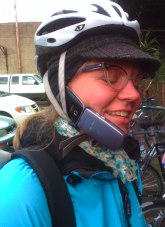“I bike and walk a lot…I’m especially careful when people are on a cell phone because their attention is obviously on someone else and not me.”
–State Rep. Carolyn Tomei, sponsor of a bill to ban use of mobile devices while driving.
A bill that would ban cell phones and texting while driving passed out of committee earlier this week and the bill’s sponsor, State Representative Carolyn Tomei (D-Milwaukie), told me this morning she would be “shocked” if it didn’t become law this session.
The bill, H.B. 2377, would make Oregon’s existing cell phone use while driving law much tougher. Tomei’s bill would make the use of a “mobile communications device” (which includes text messaging) while driving a primary offense. (I regret that earlier this week I incorrectly reported that the bill would only make it a secondary offense. I have corrected that error).
Making the infraction a primary offense is very important. This means a police officer needs no other reason to pull someone over if they’re talking on a cell phone or texting while driving.
Tomei’s bill would put a complete ban on mobile devices for drivers under 18 years of age, and would allow a hands-free device only for those over 18 years old. The bill also includes exceptions for emergency vehicle operators, agricultural equipment operators and someone who is calling for emergency help (but only if there is no passenger able to do so).
I spoke with Tomei about the bill this morning. She said they’ve gotten “overwhelming support” for the bill from all over the state. For Tomei, the bill is a result of her own experiences walking and biking around her Milwaukie neighborhood.

“I bike and walk a lot,” she said, “and I get very nervous when I come to an intersection. I’m especially careful when people are on a cell phone because there attention is obviously on someone else and not me.”
Tomei said she tried for a similar bill last session, but it couldn’t muster much support. She chalks this up to the increase in cell phone use. “Cell phones are now much more ubiquitous, they’re everywhere.”
Tomei cited a recent survey of 1,200 people that showed 73% said they talk on the phone while driving and 19% say they regularly text while driving. Tomei also said she’s heard loud and clear from constituents that it’s time to get tough on distracted drivers. “I went to a town hall recently,” she said, “and one woman stood and said ‘Tell them to hang up and drive!’. She counted 13 out of 16 people that went by her recently who were talking on the phone while driving.”
According to Tomei, her office has counted up the votes and she expects it will pass. Some detractors (including an opinion article in The Oregonian) have said that Tomei’s bill makes Oregon into a “nanny-state”. Tomei disagrees. She said, “We were being told that years ago when we required seat belts.” (Tomei was also encouraged when many readers of The Oregonian wrote in to express strong agreement with her bill.)
Others (including some legislators) have not been in favor of H.B. 2377 because it still allows hands-free devices for drivers over 18. Tomei said she’d also like to ban hands-free devices for all drivers, but that “we would never pass that this session.” Tomei doesn’t think the exception for hands-free devices is a valid excuse to not vote for the bill. “This is just a first step,” she says.

wants bike riders to be
included in any cell phone ban.
(Photo © J. Maus)
Last month, the Oregon Bicycle and Pedestrian Advisory Committee sent a letter to the Oregon Transportation Commission urging them to advise the Oregon Department of Transportation to ban cell phones and texting devices while driving and bicycling.
When I asked Tomei’s office this morning why their bill only prohibits cell phone use while driving, a legislative aide they that they wouldn’t be opposed to making it apply to bikes and cars, but that the idea simply had “never come up.”
A simple omission of the word “motor” in front of “vehicle” in the bill language should suffice in order to make this apply to all vehicles on Oregon roadways. The aide said she would work on that and get back to me about it. If necessary, the new language could be put into the Senate version of the bill and it would likely not be a significant change in terms of the bill’s support.
If you think this is an important step in improving traffic safety in Oregon, consider contacting your representative.
Stay tuned.

